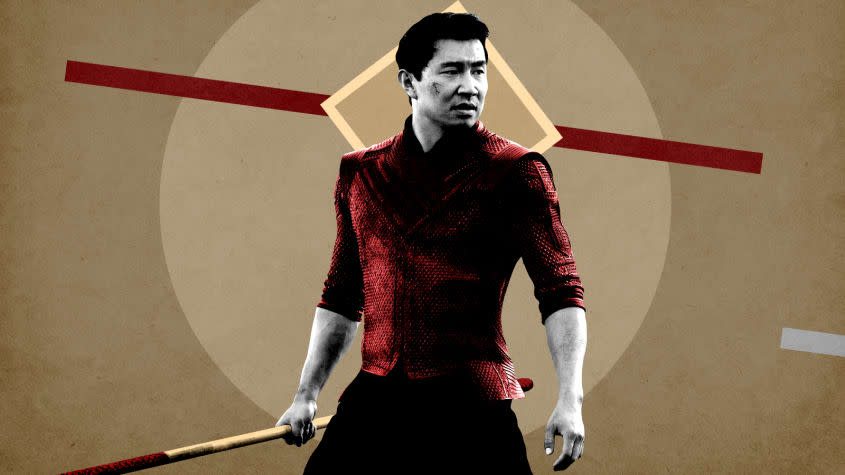You don't have to be a Marvel fan to love Shang-Chi and the Legend of the Ten Rings

- Oops!Something went wrong.Please try again later.
- Oops!Something went wrong.Please try again later.
If it ever slips your mind that a Marvel film is taking place in a broader universe, its characters tend to remind you.
As the Marvel Cinematic Universe has progressed, crossovers have become more and more frequent, and name drops of major events and characters are increasingly common. Even the advertising for this November's Eternals, a standalone film featuring all new characters, has included multiple scenes in which its heroes chat about the Avengers and Thanos. Marvel fans eat that up, and the fact that this fictional world feels so connected is a key part of its appeal. At the same time, it can be satisfying to occasionally step out of the ever-expanding established universe and get lost in a fresh new one.
If that's what you're looking for, Shang-Chi and the Legend of the Ten Rings mostly delivers. As Marvel's first film centered around an Asian lead, it's a breakthrough moment when it comes to representation in superhero blockbusters, especially significant after a year of horrific anti-Asian violence. It's also an all-around excellent origin story, which features among the most exhilarating action in the Marvel series, continues the franchise's trend of showcasing much better villains than it used to, and builds to a surprisingly ambitious second half. While it sets the stage for some future Marvel storylines, Shang-Chi is still one of the studio's more standalone recent efforts, and it brings enough unique to the table to make it an easy recommendation for non-fans, as well.
Shang-Chi kicks off by laying out the history of the Ten Rings, an organization run by a man named Wenwu (Tony Leung) that has operated in secret ever since he obtained magical rings allowing him to amass power and become immortal. In the present day, his son, Shang-Chi (Simu Liu) is living in America trying to hide from his past as a trained assassin. But Shang-Chi is eventually driven out of hiding by the Ten Rings and ends up on an adventure with his best friend Katy (Awkwafina) that will force him to face his father.
Marvel always tries to make its films understandable for newcomers, but a number of its recent solo entries have still been at least somewhat tied up in the larger Avengers narrative, with the Spider-Man movies heavily based around Peter Parker's relationship with Iron Man, Black Panther dealing with the fallout of T'Challa's introduction in Captain America: Civil War, and Captain Marvel turning into a sneaky origin story for the Avengers itself. Shang-Chi, though, establishes a new hero with a promising future but whose world is fairly separate from the Avengers' for most of the film. References to prior Marvel events are minimal, give or take a line about the Blip, and for certain stretches, it's easy to forget we're watching a movie set in the MCU at all.
That's also the case because the filmmaking in Shang-Chi stands out from much of the series, particularly when it comes to the action. Director Destin Daniel Cretton draws on classic martial arts movies to execute the most well choreographed hand-to-hand fight scenes we've seen from Marvel. An early sequence taking place on a moving bus is a high point, smoothly photographed and edited so it's easy to follow the mechanics of the fight. That's hardly a guarantee in a genre often made up of action sequences either overly reliant on quick cuts and shaky footage or iffy computer generated effects. Another fight scene in the first few minutes is oddly gorgeous, telling the story of two characters going from fighting to forming a bond as their movements begin to resemble a dance. If you don't care much about Marvel superheroes and just want to see an enjoyable martial arts film with some thrilling action, you'll be happy with Shang-Chi.
The film also stands out more from Marvel's familiar world when it takes a surprising turn in its second half and heads to a whole new realm, the secret village of Ta-Lo that's described as existing separate from our universe. It's gorgeous to look at, filled with mythical creatures unlike anything else in the MCU. An especially arresting sequence sees our heroes make their way into it while the forest moves around them to create a path. There's tons of intriguing worldbuilding here, and Cretton doesn't shy away from weirdness in order to give Shang-Chi its own identity.
In its closing act, Shang-Chi does get somewhat chaotic as it moves away from the more grounded action and makes greater use of CGI. But it thankfully avoids a conclusion that simply involves the hero punching a generic villain, as Wenwu evolves into an unexpectedly three-dimensional antagonist. The beloved Hong Kong actor Tony Leung excels in the role, preventing the character from turning into a caricature.
To be sure, Marvel can't help itself from bringing in a few connections to its larger universe. As teased in the marketing, Doctor Strange's Wong (Benedict Wong) makes a cameo, while a certain someone from a past Marvel film actually gets a full blown supporting role (though only for comedic relief, and previous knowledge of the character isn't required). And ultimately, it becomes clearer near the end how Shang-Chi fits in Marvel's plans.
But little of that is apparent during the vast majority of the runtime, allowing us to appreciate Shang-Chi's strong action, visually stunning new world, and well-developed new characters on their own. Given that Marvel's film slate after Eternals consists of a whopping seven straight sequels and the studio looks to be embarking on a massive cross-movie multiverse storyline, that's worth savoring.
You may also like
Is rural America becoming a new Confederacy?
Actor suspected of participating in Capitol attack arrested in California

